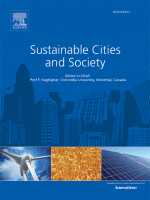Assessing the sustainability of urbanization at the sub-national level: The Ecological Footprint and Biocapacity accounts of the Budapest Metropolitan Region, Hungary
Zoltán Kovács – Jenő Zsolt Farkas – Cecília Szigeti – Gábor Harangozó
Sustainable Cities and Society, Volume 84, September 2022
Highlights
- EF and BC calculations can help assess urbanization at the sub-national level
- EF and BC calculations show unsustainability in the Budapest Metropolitan Region;
- An inverted U-shaped relationship between urbanization and EF cannot be justified;
- Policies should aim to reduce the growth of EF, and halt the decrease of BC;
- Growing environmental efficiency and new consumption habits are required;
Abstract
The growing concentration of people and wealth often results in imbalances of resource consumption and carrying capacity, therefore, the sustainability assessment of urbanization can offer an important basis for global sustainable transition. This paper aims to provide an analysis of the environmental sustainability of urbanization in Hungary focusing on the long-term changes of ecological footprint and biocapacity at the sub-national level, with a special attention to the Budapest Metropolitan Region (BMR). During the research a hybrid method considering an input-output model and household consumption data was used for the calculation of regional ecological footprint, whereas biocapacity was measured on the basis of land use data. Findings suggest, that even though the ecological deficit of the country has been gradually decreasing since the early 2000s, due to a shrinking population and increasing biocapacity, the ecological overshoot is still significant in the case of Budapest and its agglomeration (30 fold and 2.4 fold respectively).  The unsustainability of the BMR is caused partly by demographic factors (7.6% population growth as opposed to the the 7.7% decrease in the countryside) and partly by rising per capita ecological footprint values (especially in the agglomeration from 2.73 to 2.92 gha/capita), which are not balanced by biocapacity on the supply side. This research concluded that policy makers in ageing societies with a highly centralized urban system like Hungary should launch programmes targeted specifically to primary metropolitan areas to improve environmental efficiency and encourage people to change their consumption behaviour.
The unsustainability of the BMR is caused partly by demographic factors (7.6% population growth as opposed to the the 7.7% decrease in the countryside) and partly by rising per capita ecological footprint values (especially in the agglomeration from 2.73 to 2.92 gha/capita), which are not balanced by biocapacity on the supply side. This research concluded that policy makers in ageing societies with a highly centralized urban system like Hungary should launch programmes targeted specifically to primary metropolitan areas to improve environmental efficiency and encourage people to change their consumption behaviour.
Keywords: Sustainable cities, Ecological footprint, Biocapacity, Carrying capacity, Ecological deficit, Land use, Urban agglomeration


